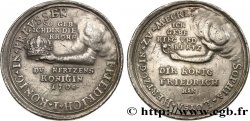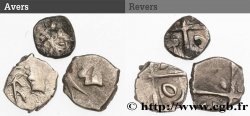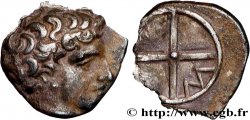fwo_977035 - DEUTSCHLAND - PREUßEN 1/3 de Thaler Frédéric II 1774 Brandebourg
45.00 €
Menge
In den Warenkorb

Type : 1/3 de Thaler Frédéric II
Datum: 1774
Name der Münzstätte / Stadt : Brandebourg
Metall : Silber
Der Feingehalt beträgt : 660 ‰
Durchmesser : 30 mm
Stempelstellung : 12 h.
Gewicht : 8,09 g.
Rand décorée
Kommentare zum Erhaltungszustand:
Nombreuses aspérités de surface
N° im Nachschlagewerk :
Vorderseite
Titulatur der Vorderseite FRIDERICUS BORUSSORUM REX.
Beschreibung Vorderseite Tête laurée à droite de Frédéric II.
Rückseite
Titulatur der Rückseite 3 EINEN REICHS THALER 1774 B.
Beschreibung Rückseite Couronne de lauriers.
Kommentare
Frédéric naquit à Berlin le 24 janvier 1712 et est le fils de Frédéric-Guillaume Ier. Il fut d'abord l'allié de la France dans la Guerre de Succession d'Autriche (1740-1748) puis il y eut retournement d'alliance lors de la Guerre de Sept Ans (1756-1763). Il fut l'un des grands vainqueurs du traité de Paris (1763) et participa au premier démembrement de la Pologne (1772). Frédéric II (1712-1786) fut le plus grand roi de Prusse. Ami de Voltaire, il écrivait en français et fut le modèle du despote éclairé de la seconde moitié du XVIIIe siècle. Il succéda à son père Frédéric-Guillaume, le Roi Sergent et fit de Berlin une véritable capitale et du Château de Sans Souci à Postdam un petit Versailles. Grâce à une politique belliqueuse, il fit de la Prusse l'état le plus puissant de l'Europe Orientale et contrebalança l'influence de l'Autriche et de la Russie. Il mourut au château de Sans-Souci (Potsdam), le 17 août 1786.
Frederic was born in Berlin on January 24, 1712 and is the son of Frederick William I. It was first France's ally in the War of the Austrian Succession (1740-1748) then there was a reversal of alliance during the Seven Years' War (1756-1763). He was one of the great winners of the Treaty of Paris (1763) and took part in the first dismemberment of Poland (1772). Frederick II (1712-1786) was the greatest king of Prussia. Friend of Voltaire, he wrote in French and was the model of the enlightened despot of the second half of the 18th century. He succeeded his father Frédéric-Guillaume, King Sergent and made Berlin a real capital and the Château de Sans Souci in Potsdam a little Versailles. Thanks to a warlike policy, he made Prussia the most powerful state in Eastern Europe and counterbalanced the influence of Austria and Russia. He died at the castle of Sans-Souci (Potsdam), August 17, 1786
Frederic was born in Berlin on January 24, 1712 and is the son of Frederick William I. It was first France's ally in the War of the Austrian Succession (1740-1748) then there was a reversal of alliance during the Seven Years' War (1756-1763). He was one of the great winners of the Treaty of Paris (1763) and took part in the first dismemberment of Poland (1772). Frederick II (1712-1786) was the greatest king of Prussia. Friend of Voltaire, he wrote in French and was the model of the enlightened despot of the second half of the 18th century. He succeeded his father Frédéric-Guillaume, King Sergent and made Berlin a real capital and the Château de Sans Souci in Potsdam a little Versailles. Thanks to a warlike policy, he made Prussia the most powerful state in Eastern Europe and counterbalanced the influence of Austria and Russia. He died at the castle of Sans-Souci (Potsdam), August 17, 1786








 Berichten über einen Fehler
Berichten über einen Fehler Die Seite drucken
Die Seite drucken Teilen meiner Auswahl
Teilen meiner Auswahl Stellen Sie eine Frage
Stellen Sie eine Frage Einlieferung/Verkauf
Einlieferung/Verkauf
 Details
Details















